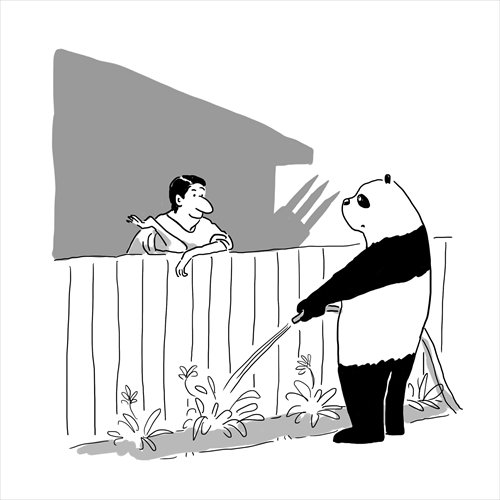HOME >> OP-ED
Beijing can't risk pushing Seoul closer to US
By Lee Seong-hyon Source:Global Times Published: 2016/7/12 19:20:11

Illustration: Liu Rui/GT
With the deployment decision of THAAD, the much-touted "honeymoon" period between Seoul and Beijing is over, but it doesn't mean that the couple will divorce. Very few people divorce after they return from the honeymoon, even though they have to face the reality of everyday life.
From South Korea's perspective, it was a very difficult decision to make. I knew it personally because I attended some of the discussions on the pros and cons of THAAD. There are technical aspects that other experts are more qualified to comment on. So, I will touch upon the "thinking process" on the part of South Korea, especially where it is relevant to China.
First of all, THAAD was not a "new" issue. Seoul and Beijing, together with Washington, have been discussing it through diplomatic channels over the years. Even though it was made public two years ago, experts in China and South Korea were not strangers to the matter. The issue was also on the table at the recent US-China Strategic & Economic Dialogue, held in Beijing. So, it was not a sudden, out-of-the-blue insult Seoul and Washington staged to catch China off-guard.
Second, many Chinese friends are disappointed with South Korea's decision on THAAD. But they don't seem aware that South Korea's decision was, actually, based on its own disappointment with China, mainly about North Korea. Seoul has invested an inordinate amount of diplomatic resources to get along with Beijing, expecting that Beijing would reciprocate Seoul's outreach by containing North Korea's belligerence. President Park Geun-hye even risked her relationship with America by deciding to attend the military parade last year, hosted by Chinese President Xi Jinping. She was the only leader of a country that is an American ally.
Beijing initially appears to reciprocate in this direction with a good will, by joining the international community to mete out punitive measures against North Korea's nuclear tests. But its actions have been always called into question as not enough to stop Pyongyang.
For South Koreans, it was somewhat odd to see why globally "responsible stakeholder" China couldn't deal responsibly with North Korea, often giving the impression that Beijing actually "protects" the regional trouble-maker whose nuclear and missile ambitions are a common geopolitical liability, even to China itself as well. When North Korea conducted its fourth nuclear test in January, she held an emergency phone consultation with US President Barack Obama and Japanese Prime Minister Shinzo Abe. But what South Koreans were eager to see was a picture of Park consulting Xi over the phone. That would have sent a clear signal to people that Beijing cares about Seoul. Unfortunately, it didn't happen until a month later when South Koreans had already given up hope in China.
Likewise, China's acts have been called into question in many occasions when it comes to North Korea. For instance, in the aftermath of the sinking of South Korean navy corvette Cheonan in 2010, China simply called for "calm" in both Koreas. I remember at that time South Koreans were outraged by China's attitude, which amounts to asking a robbery victim to be calm and not do anything as the robber walks away.
Third, against the backdrop, over the years, South Koreans have come to have awareness that they cannot solely rely on China to check North Korea's belligerence. North Korea has been upgrading its nuclear and missile capabilities, exposing South Korea to ever more serious threats. Pyongyang often threatens to turn Seoul into "a sea of fire." With Beijing not offering any assurance of how it will stop North Korea or protect South Korea, Washington suggested THAAD. In the eyes of South Koreans, Washington appeared to be a more genuine friend.
North Korea has so far conducted four nuclear tests, each time demonstrating more advanced technical achievements. Now, it claims to be a nuclear power. It is also near completing building an intercontinental ballistic missile that can reach halfway around the world. It's a fair question to ask China what it has done to stop North Korea.
Finally, the issue of whether China will revenge South Korea for agreeing to deploy THAAD. Here, I urge my Chinese friends to be more strategic. China, as a big and resourceful country, has the will and capability to corner its smaller neighbor South Korea. But what good, at the end of the day, will it bring to China's regional interests, especially vis-à-vis the US? For instance, if China really pushes South Korea, South Korea will be pushed. But where will it be pushed to? South Korea will be pushed closer toward the US and this will strengthen the US-led trilateral Washington-Seoul-Tokyo military structure, resulting in a "new Cold War." Is this what China wants?
China may claim to be a victim of THAAD deployment, but it should be aware that, from Seoul's perspective, South Korea has been a victim for a long time of North Korea, while China looked the other way.
The author is a PhD holder and a research fellow at the Sejong Institute in Seoul. opinion@globaltimes.com.cn
Posted in: Viewpoint, Asian Review